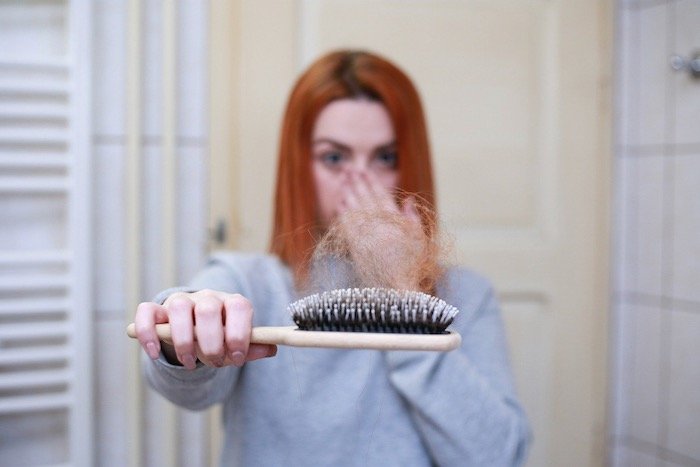
Dermatologists are reporting a rise in people complaining about stress-related hair loss.
And they’re blaming it on the COVID-19 pandemic.
You may be one of those people feeling like your hair is falling out. Also called “lockdown hair loss,” the condition is frustrating and frightening, particularly if you’re noticing that your hair is thinning, receding, or leaving behind bare spots.
Try not to panic. Though genetically inspired hair loss is difficult to treat, stress-related hair loss can be managed. We show you how.
Is Stress-Related Hair Loss Real?
There are many potential reasons why hair may thin or fall out, but stress is one of them. Scientists have found that stress—particularly lasting or chronic stress, like many people have suffered through the COVID-19 pandemic—can trigger changes in the scalp that lead to increased hair loss.
In a 2017 animal study, for instance, researchers found that when subjects experienced prolonged stress, it enhanced inflammation, affecting hair growth. Dr. Daniel K. Hall-Flavin, writing for the Mayo Clinic, agrees that stress and hair loss can be related. According to him, stress pushes large numbers of hair follicles into a resting phase (in a condition called “telogen effluvium”), and within a few months, the affected hairs can fall out when simply combing or washing.
He also had some good news: “If you get your stress under control, your hair might grow back.”
Stress Can Exacerbate Other Forms of Hair Loss
Each hair follicle on your head is constantly cycling between growth and rest. The majority of them are in the growth phase at any given time, which allows you to enjoy a full, healthy head of hair. When the hair follicle goes into the resting phase, the hair is shed. Periods of high stress can trigger a sudden, abnormal shift of hairs into the resting phase all at once, leading to increased shedding.
In a 2000 study, researchers noted that stress-induced changes can alter hair growth. Other research has found that stress can not only trigger hair loss but may also aggravate a hair loss disorder such as alopecia or male-pattern baldness.
 Does COVID-19 Cause Stress-Related Hair Loss?
Does COVID-19 Cause Stress-Related Hair Loss?
Whether you experienced hair loss because of COVID-19 depends on your individual experience of the pandemic, but it’s possible.
Dr. Serkin Aygin, who was named Europe’s Best Hair Transplant Surgeon in 2019, told Evoke that the lockdowns and uncertainty that came along with the pandemic, as well as being constantly indoors, “has caused a lot of anxiety and stress which is most likely the main cause of any shedding or hair loss.”
He added that even if you think you’ve done all right through the pandemic, “your hair may be reflecting a different truth,” noting that dull and lifeless hair that is prone to breakage can be an indicator of stress and anxiety.
What Causes Dry, Itchy Scalp and Hair Loss?
In addition to chronic levels of high-stress that may trigger inflammation and hair loss, there are other possible factors—some related to the pandemic—that can contribute to an unhealthy scalp and shedding hair:
- Dietary changes: If you changed how you eat during the pandemic, particularly if you turned to more high-fat, high-sugar comfort foods, that could trigger hair loss.
- Lack of exercise: A sedentary lifestyle leads to reduced blood circulation and a potential increase in overall inflammation. Since exercise helps relieve stress, a lack of exercise can exacerbate stress-related hair loss.
- No more fun: Most of us missed out on our usual fun activities during the pandemic. We may not have appreciated before how much these activities helped us blow off steam, but we sure do now.
- Viral infection: Developing any type of stressful illness can push more hairs into their resting phase and lead to increased shedding. In a 2021 study, scientists found that 22 percent of hospitalized COVID-19 patients reported hair loss six months later.
- Age: After the age of 30, you may be surprised to learn that both men and women begin to lose their hair. This points to the need to tend to our scalps more carefully as we age to maintain healthy hairstyles.
- Genetics: Hormones can trigger genetic-related hair loss as we age, with testosterone being the main culprit. Both women and men have testosterone in their systems, so both can be affected, though men are usually affected more. This type of hair loss is caused not by more hair falling out, but by fewer hairs growing back to replace those that have been shed.
- Alopecia areata: This is a condition in which the immune system attacks your hair follicles, causing the hair to fall out. It often creates bald patches. Doctors aren’t sure what causes this condition, but believe it may be related to genetics. Stress can make it worse.
- Scalp eczema: Also called seborrheic dermatitis, this is a form of eczema that affects the scalp, causing patches of red, flaky, greasy skin that itch. The extra sebum can trigger inflammation that may cause some hair loss, though this is easily reversed when the condition is treated.
Are You A Victim of Stress-Related Hair Loss?
To determine if you may be losing your hair because of stress, look for these clues:
- More than 100 strands of hair clog your shower drain or hairbrush per day.
- You’re finding more hair than usual on your pillow.
- You notice hair thinning on the scalp.
- You started noticing excess hair shedding about three months after a stressful event began.
If your hair loss follows more of these patterns, it’s likely to be genetic:
- Hair loss begins at the temples and crown and proceeds in an M-shaped pattern (most common in men)
- The top of the head down the middle is affected, sort of like a “Christmas tree” pattern (most common in women)
How Can I Prevent or Treat Stress-Related Hair Loss?
Below are some steps you can take to stop your hair from shedding and build your way back to a full head of hair in a few months.
1. Address the Stress
We’ve all experienced more stress than usual these days. Fortunately, with the vaccines now available, things are beginning to ease up. Your life, however, may still be super stressful.
Try to lessen the stress if you can, but if not, make sure you practice a daily stress-relieving activity. Examples include exercise, yoga, tai chi, meditation, journaling, walking, time with friends and family, massage, and more. The important thing is to find a way to step back and relax for at least 30 minutes every day.
2. Eat Right
With the warmer weather on the way, you may already be craving more fruit, salads, and lighter meals. This is the perfect time to stock up on wholesome, nutritious foods, as these can help your body battle stress while taming inflammation.
3. Get moving!
Exercise is a miracle-worker when it comes to easing stress and boosting circulation, both of which can benefit your hair. Don’t allow for any more excuses. Get involved in some sort of exercise that you enjoy and do it most days of the week.
 4. Tame the Inflammation
4. Tame the Inflammation
We know that stress increases inflammation and that your skin is often a victim of that inflammation, including the skin on your scalp. Inflammation hinders hair growth, so if you’re suffering from stress-related hair loss, you need to address any possible inflammation.
- Wash frequently: During the pandemic, many of us stopped worrying about styling our hair. Not washing your hair for days, however, can lead to a buildup of skin oils and grime, and that can negatively affect the follicles and potentially lead to hair loss. Not washing your hair can also lead to more itching and irritation, an indication that your scalp isn’t happy. If you’re worried about fading your color, choose a color-safe shampoo.
- But don’t wash excessively: Just as too little washing can create problems, so too can excessive washing. Listen to your scalp for clues, and in general, wash your hair at least once every other day.
- Tone your scalp: Just like you use a toner on your skin to help soothe and cool it, you can also use a toner on your scalp to help tame inflammation and nourish the skin. We recommend our Rescue + Relief Spray, as it has ingredients specifically included for their anti-inflammatory properties. Simply spray on your hair after conditioning, or use it during the day when you notice itching and irritation.
- Moisturize your scalp: Inflammation and irritation are often signs of scalp dryness. Unfortunately, the conditioner is unlikely to help. It conditions the hair strands but does little to hydrate your scalp. Oils, as well, can clog pores and make flaking worse, while weighing hair down. Choose a scalp moisturizer and use it regularly to combat dryness and soothe inflammation. Our Calming Moisture for Face, Neck, and Scalp is a great option—read more about it below.
5. Avoid Tight Hairstyles
Ponytails, buns, and other styles that involve tying or fastening the hair can increase breakage and result in greater hair loss. Until you recover, avoid these types of styles.
6. Use Hair Masks
Just as your face benefits from regular exfoliation and hydration, your scalp can too. You can help prevent or keep inflammation at bay by using a targeted scalp mask twice a week.
There are several hair masks on the market now to choose from. Look for those that will address your particular issue. If you’re suffering from inflammation, dryness, and flakiness, you can use a combination of our Rescue + Relief Spray and Calming Moisture. Use the spray first, rub it into the scalp, then follow with our Calming Moisture, again rubbing it carefully into the skin of the scalp.
Our Calming Moisture was designed specifically for the face, neck, and scalp, so it is meant for this purpose! It contains our proprietary Tri-Rescue Complex, which includes the powerful anti-inflammatory turmeric, and Reishi mushroom. These and the other ingredients will help tame inflammation while hydrating the scalp and nourishing the skin.
7. Try Scalp Massage
Though there is no evidence that scalp massage can cure hair loss, it may promote hair growth. This is mainly due to its ability to increase blood flow to the scalp, which can bring needed nutrients to the hair follicles. A scalp is also relaxing, which can help reduce the effects of stress.
You can go to a trained massage therapist or simply perform the massage yourself. Using your fingertips, apply light to medium pressure to your scalp, moving in small circles. Work your way across the scalp to cover all areas. Spend at least five minutes at a time, and repeat several times a day if you can.
Are you suffering from stress-related hair loss?
References:
Hall-Flavin, Daniel K. “Can Stress Make You Lose Your Hair?” Mayo Clinic. Last modified April 5, 2019. https://www.mayoclinic.org/healthy-lifestyle/stress-management/expert-answers/stress-and-hair-loss/faq-20057820.
Paus, Ralf. “Stress, Hair Growth Control, and the Neuro-Endocrine-Immune Connection.” Allergo Journal 9, no. 7 (2000), 411-420. doi:10.1007/bf03370271.
Peters, Eva M., Yvonne Müller, Wenke Snaga, Herbert Fliege, Anett Reißhauer, Thomas Schmidt-Rose, Heiner Max, Dorothea Schweiger, Matthias Rose, and Johannes Kruse. “Hair and stress: A pilot study of hair and cytokine balance alteration in healthy young women under major exam stress.” PLOS ONE 12, no. 4 (2017), e0175904. doi:10.1371/journal.pone.0175904.

